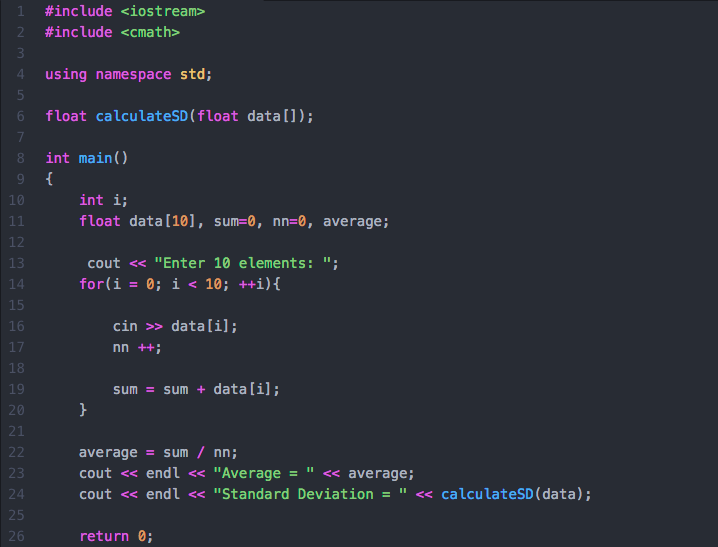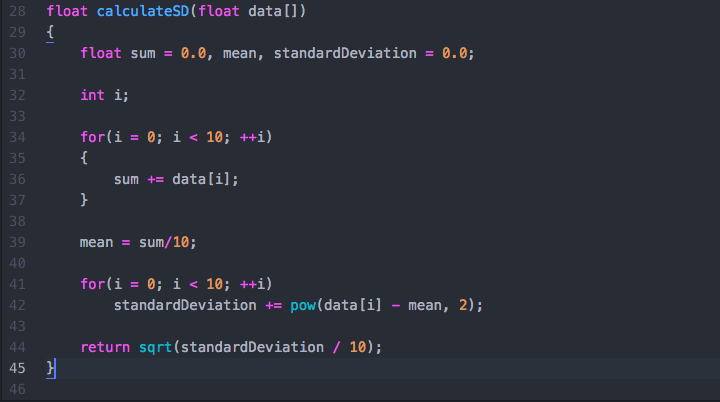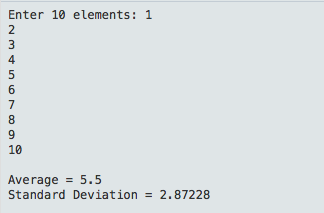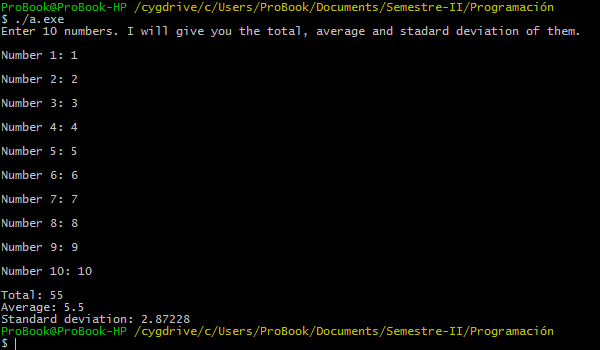--Originally published at Loading…
Tag: #Mastery18
Post of the weeks #11,12,13,14,15 and 16 what things I learned in these weeks ? And Index of Mastery Topics
--Originally published at Solving Problems with Programming
Picture of author
First let me tell you that I learn and achieved all transversal topics and you can see it in the following link: Post of the week #3 what things i learned in this week #3 ? And Index of Mastery Topics
I also explain my project and formed a small team that corresponds of completing this ability to create C++ project in IDE and run inside the IDE and can be explained in my post My Project For the Course TC1017 and Expo Ing. Let’s code!
Futhermore, I am going to present the report of all the Mastery Topics achieved in this week:
- #Mastery01 Use of comments, achieved in: Post of the week #2 what things i learned in this week #2 ?
- #Mastery02 C++ Good Style coding conventions, achieved in: Post of the week #2 what things i learned in this week #2 ?
- #Mastery03 Basic types and their use, achieved in: Post of the week #2 what things i learned in this week #2 ?
- #Mastery04 Basic output (print), achieved in: Post of the week #2 what things i learned in this week #2 ?
- #Mastery05 Basic user input (text based), achieved in: Post of the week #2 what things i learned in this week #2 ?
- #Mastery06 Calling functions, achieved in: #Quiz03. Also here:#WSQ08 Yo soy 196 11/03/17 and WSQ08.cpp
- #Mastery07 Creating functions, achieved in: #Quiz03. Also here: #WSQ08 Yo soy 196 11/03/17 and WSQ08.cpp
- #Mastery08 Importing and using libraries, achieved in: Post of the week #1 what things i learned in this week #1 ? Also in #WSQ08 Yo soy 196 11/03/17 and WSQ08.cpp
- #Mastery09 Creating and using your own libraries (program with multiple files), achieved in: #Quiz03. Furthermore, also in here: #WSQ08 Yo soy 196 11/03/17 and WSQ08.cpp
- #Mastery10 Use of the conditional “if”, Continue reading "Post of the weeks #11,12,13,14,15 and 16 what things I learned in these weeks ? And Index of Mastery Topics"

#WSQ12 Estimating e 15/04/17 and WSQ12.cpp
--Originally published at Solving Problems with Programming
So in this fourteen week class I started with doing this WSQ12 I started reviewing in creating and calling functions in C++.#Mastery06, #Mastery07, #Mastery16 Use of recursion for repetitive algorithms, #Mastery17 When to use what type of repetition in a program, #Mastery18 Creation and use of Arrays/ Vectors in C++. Furthermore, in this stage I have all the topics of the course from 1 to 22.
What I did for this numeric program is solving the problem to the user by creating a program with writing this assignment where I will estimate the mathematical constant e. I should create a function called calculuate_e which receives one parameter called precision that should specify the number of decimal points of accuracy.
I will want to use the infinite series to calculate the value, stopping when the accuracy is reached (previous and current calculation are the same at the specified accuracy).
Hence, the resources I need it to solve this program are here:
For doing this tutorial you need to do the factorial, therefore you need to see my tutorial #WSQ06 Factorial Calculator 12/02/17 and WSQ06.cpp
ken bauer
And the next picture shows us how the number e is calculated with infinite series and I will do this infinite serie in c++

The following photograph shows the solution to this problem:
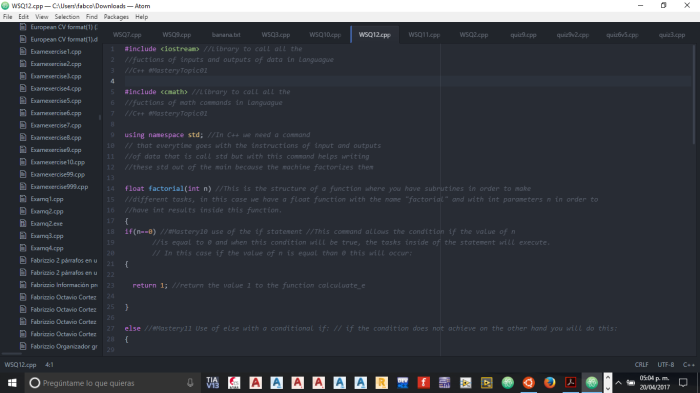
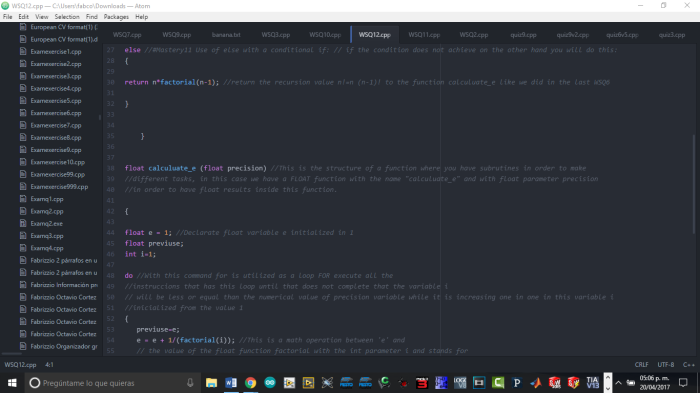


So at first I wrote the same structure of the program just did the same as what i did in Hello World: Second Class, Second Blog (Blog of the second class 12/01/17) and Hello World.cpp, #WSQ01 Post Fun with Numbers 16/01/17 and WSQ1.cpp, #WSQ02 Post Temperature 23/01/17 and WSQ02.cpp, #WSQ03 Post Pick a Number 23/01/17 and WSQ03.cpp, #WSQ04 Post Sum of Numbers 23/01/17 and WSQ04.cpp, #WSQ05 Six Tutorial On To Functions 12/02/17 and 
![]()
#WSQ11 Go Bananas 15/04/17 and WSQ11.cpp
--Originally published at Solving Problems with Programming
So in this fourteen week class I started with doing this WSQ11 I started reviewing in creating and calling functions in C++.#Mastery06, #Mastery07, #Mastery16 Use of recursion for repetitive algorithms, #Mastery17 When to use what type of repetition in a program, #Mastery18 Creation and use of Arrays/ Vectors in C++. Furthermore, in this stage I have all the topics of the course from 1 to 22 including #Mastery22 Matrixes and vectors because in this code I use a matrix with a dimension of 1.
What I did for this numeric program is solving the problem to the user by creating a program with writing a function called find_bananas which receives a single parameter called filename (a string) and returns a positive integer which is the number of times the word (string) “banana” (or “BANANA” ) is found in the file. The banana can be any case (‘BaNana’ or ‘BANANA’ or ‘banana’, etc) and they can be “stuck together” like “banAnaBANANA” (that counts as two). Create your own test file (plain text) to check your work.
Hence, the resources I need it to solve this program are here:
ken bauer
Video to convert higher to lower cases from the .txt file
The following photograph shows the solution to this problem:
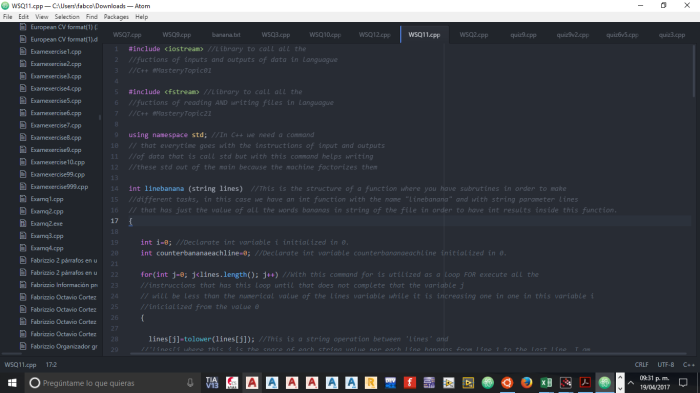


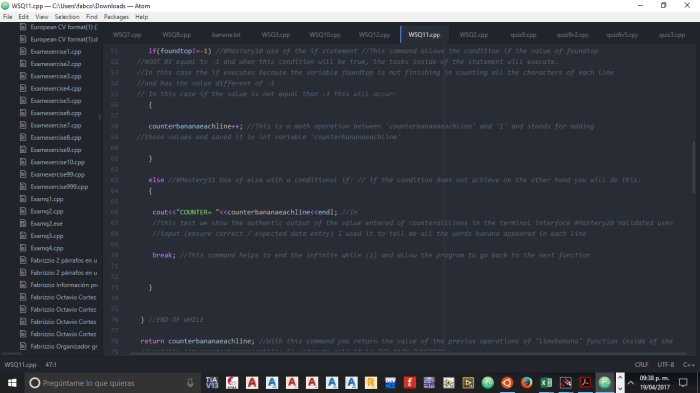
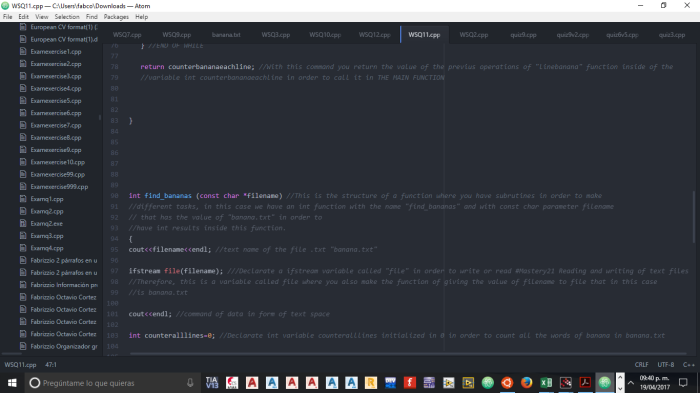
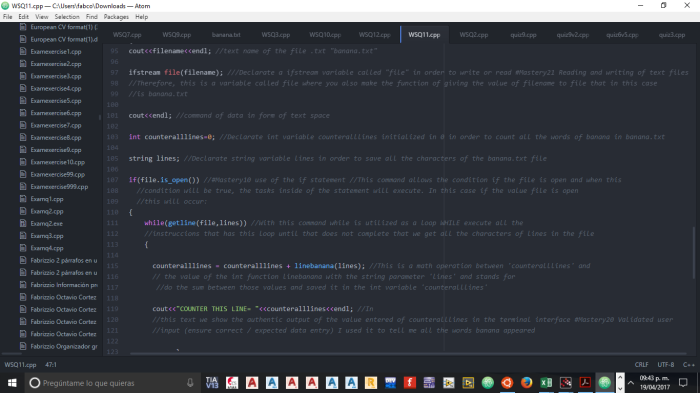


So at first I wrote the same structure of the program just did the same as what i did in Hello World: Second Class, Second Blog (Blog of the second class 12/01/17) and Hello World.cpp, #WSQ01 Post Fun with Numbers 16/01/17 and WSQ1.cpp, #WSQ02 Post Temperature 23/01/17 and WSQ02.cpp, #WSQ03 Post Pick a Number 23/01/17 and WSQ03.cpp, #WSQ04 Post Sum of Numbers 23/01/17 and WSQ04.cpp, #WSQ05 Six Tutorial On To Functions 12/02/17 and WSQ05.cpp, #WSQ06 Factorial Calculator 12/02/17 and WSQ06.
![]()
Quiz
--Originally published at Loading…
Hi! I know it pass a long time without posting anything, sorry I’m in that point of the semester trying to save it.
And I know maybe this post would be more useful the last week, before the partial, but… I hope it could help you.
1. Distance again.
Actually I’ve already explain this code, and I do the same in this quiz, so I’m not going to explain this one, but here is my code:

2. T’s pyramid
This one was kind of difficult because one of my functions was wrong, but technically it’s veryyyy easy.
I only use the library <iostream>, but I used two functions. The first one was for print the T in each line, for this I used an if and a for, which simply is adding one T in each line of the pyramid. The second function is for print how many lines must have the pyramid, so I use two for, one to increase f (fila) while it’s smaller than n(the number that the user enter). And the other one to decrease f, when it is the same as n and until f is 1.

3. n!
This one I’ve already explained too, so like the first one, I’m not going to explain it. The only difference is that I made this code more simply like the one that is in the link.

4. Average list
This one was kind of easy. First I established the libraries <iostream> and <cmath> and as always put the using namespace std;. Then, I created a float function named promedio_lista that receives the sum and returns the prom. Next, in my int main I established two kind of variables, in the float I put the array cal[7] (this ‘save’
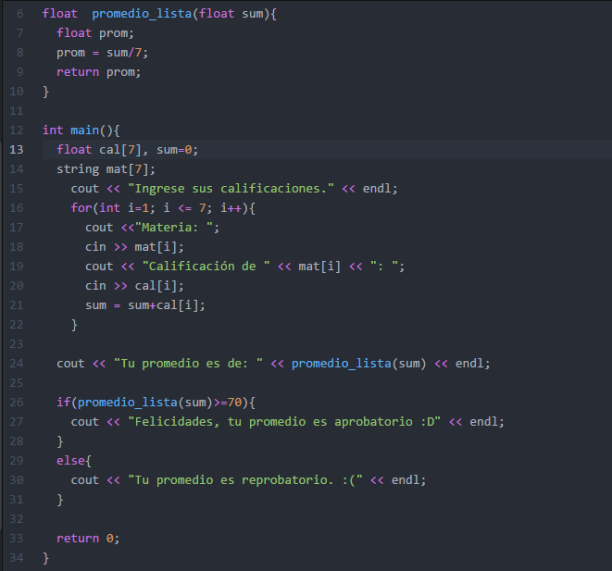






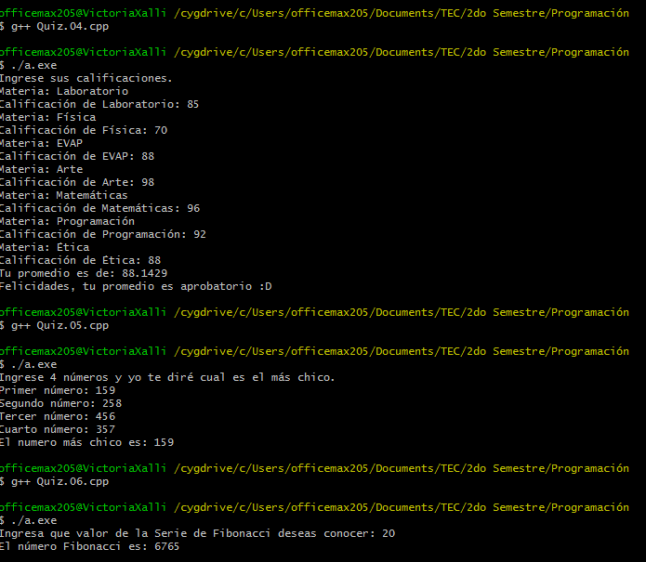
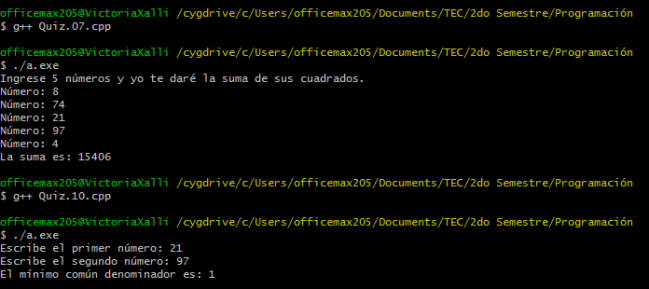
#WSQ10 Babylonian Method 21/03/17 and WSQ10.cpp
--Originally published at Solving Problems with Programming
So in this twelve week class I started with doing this WSQ10 I started reviewing in creating and calling functions in C++.#Mastery06, #Mastery07, #Mastery16 Use of recursion for repetitive algorithms, #Mastery17 When to use what type of repetition in a program, #Mastery18 Creation and use of Arrays/ Vectors in C++. Futhermore, in this stage I have all the topics of the course from 1 to 20.
What I did for this numeric program is solving the problem to the user by creating a program with writing a function to calculate the square root of a number using the Babylonian method. You can search for that method, it will be easy to find. Hence, you can have it here in the survey that we did last week:

Then, we need that this the function should receive a number and return floating point number. Obviously you should test your function, so create a main program that asks the user a value, calculates the square root and displays that.
Hence, the resources I need it to solve this program are here:
ken bauer
Similar code provided by Xochitl96
The following photograph shows the solution to this problem:



So at first I wrote the same structure of the program just did the same as what i did in Hello World: Second Class, Second Blog (Blog of the second class 12/01/17) and Hello World.cpp, #WSQ01 Post Fun with Numbers 16/01/17 and WSQ1.cpp, #WSQ02 Post Temperature 23/01/17 and WSQ02.cpp, #WSQ03 Post Pick a Number 23/01/17 and WSQ03.cpp, #WSQ04 Post Sum of Numbers 23/01/17 and WSQ04.cpp, #WSQ05 Six Tutorial On To Functions 12/02/17 and WSQ05.cpp, #WSQ06 Factorial Calculator 12/02/17 and WSQ06.cpp, #WSQ07 Lists 03/03/17 and WSQ07.cpp, #WSQ08 Yo soy 196 11/03/17 and WSQ08.
![]()
Post of the weeks #6,7,8,9 and 10 what things I learned in these weeks ? And Index of Mastery Topics
--Originally published at Solving Problems with Programming
Picture of author
First let me tell you that I learn and achieved all transversal topics and you can see it in the following link: Post of the week #3 what things i learned in this week #3 ? And Index of Mastery Topics
I also explain my project and formed a small team that corresponds of completing this ability to create C++ project in IDE and run inside the IDE and can be explained in my post My Project For the Course TC1017 and Expo Ing. Let’s code!
Futhermore, I am going to present the report of all the Mastery Topics achieved in this week:
- #Mastery01 Use of comments, achieved in: Post of the week #2 what things i learned in this week #2 ?
- #Mastery02 C++ Good Style coding conventions, achieved in: Post of the week #2 what things i learned in this week #2 ?
- #Mastery03 Basic types and their use, achieved in: Post of the week #2 what things i learned in this week #2 ?
- #Mastery04 Basic output (print), achieved in: Post of the week #2 what things i learned in this week #2 ?
- #Mastery05 Basic user input (text based), achieved in: Post of the week #2 what things i learned in this week #2 ?
- #Mastery06 Calling functions, achieved in: #Quiz03. Also here:#WSQ08 Yo soy 196 11/03/17 and WSQ08.cpp
- #Mastery07 Creating functions, achieved in: #Quiz03. Also here: #WSQ08 Yo soy 196 11/03/17 and WSQ08.cpp
- #Mastery08 Importing and using libraries, achieved in: Post of the week #1 what things i learned in this week #1 ? Also in #WSQ08 Yo soy 196 11/03/17 and WSQ08.cpp
- #Mastery09 Creating and using your own libraries (program with multiple files), achieved in: #Quiz03. Furthermore, also in here: #WSQ08 Yo soy 196 11/03/17 and WSQ08.cpp
- #Mastery10 Use of the conditional “if”, Continue reading "Post of the weeks #6,7,8,9 and 10 what things I learned in these weeks ? And Index of Mastery Topics"

#WSQ08 Yo soy 196 11/03/17 and WSQ08.cpp
--Originally published at Solving Problems with Programming
PICTURE OF ACTOR
So in this nine week class I started with doing this WSQ09. I started reviewing in creating and calling functions in C++.#Mastery06, #Mastery07, #Mastery16 Use of recursion for repetitive algorithms, #Mastery17 When to use what type of repetition in a program, #Mastery18 Creation and use of Arrays/ Vectors in C++. Futhermore, in this WSQ assignment we have mostly all the topics of the course from 1 to 20.
What I did for this numeric program is solving the problem to the user by creating a program that asks the user for two pieces of data:
- The lower bound of the sequence
- The upper bound of the sequence
- The range of numbers analysed (lower to upper bound)
- The number of natural palindromes (no addition to inverse needed)
- The number of non-Lycherels encountered (become palindromes)
- The number of Lycherel number candidates (that did not converge to palindrome)
Since you will not be able to prove that a number is Lycherel (since you cannot computer forever to check), our definition for a Lycherel candidate will be if a number does not converge after 30 iterations of applying the addition to the inverse.
To get this working well, you will need support for Big Integers. So I need to use that library that my teacher ken bauer has given to me, here you go:
This link is for Library of Big Integer provided by ken bauer
Hence, the resources I need it to solve this program are here:
ken bauer
Similar code provided for 





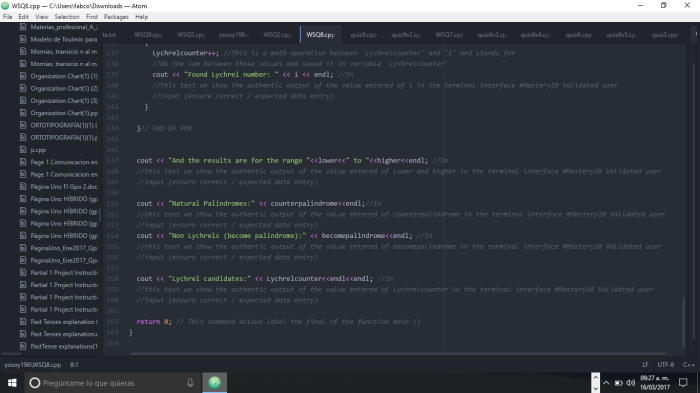

![]()
THE List -.-‘! (WSQ07)
--Originally published at Programming Path
What a way to give me stress! This task gave me a lot of problems, because it was the first time for me to use arrays, and I looked it in the textbook of the course but didn’t help that much. Then I looked for arrays in the net. I found a tutorial of arrays that explains what are they for and how to use them.
Anyway, the task was this:
Create a program that asks the user for 10 numbers (floating point). Store those numbers in a list. Show to the user the total, average and standard deviation of those numbers.
We could use arrays or vectors. I didn’t know neither of those, but is never too late to try learn something new. After I understood a little about how do the arrays work I started writing my code. Everything was fine until I needed the standard deviation. To be honest, I did not know what was the standard deviation until this task, I don’t even remember seeing it in elementary school, or middle school, so I had to look for the formula. Here is the formula:
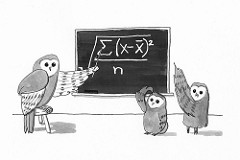
After finding the formula, it gave me a lot more trouble because I had to assign more variables. And that is how I ended up with this code. Not vary proud of this:
#include <iostream>
#include <cmath>
using namespace std;float total, av, stde, s;
float StandardD (float,float,float,float,float,float,float,float,float,float);int main () {
float a, b, c, d, e, f, g, h, i, j;
float foo [] = {a, b, c, d, e, f, g, h, i, j};
cout << “Enter 10 numbers. I will give you the total, average and stadard deviation of them.” << endl;
cout << endl << “Number 1: “;
cin >> a;
cout << endlContinue reading "THE List -.-‘! (WSQ07)"
Well… :) not to easy
--Originally published at Tec Life
This was the problem:
Create a program that asks the user for 10 numbers (floating point). Store those numbers in a list. Show to the user the total, average and standard deviation of those numbers.
This was a hard one, in this problem you need to convine everything you know about programming till now… so, not to easy.
The first thing that I do was doing an array of 10 digits and a cout to the user can type his 10 numbers, then I add a counter to now how many times I am going to put a number, and I make a operation that does that the numbers going to add each other, then I put that the average is equal to the sum divided the times I put a number, that was all in the first part.
The second part was to make a function that gives the standard deviation of the numbers I put (image 2), so I search on internet what to do to make that operation and I do the same as the average but a little different, it was a kind of pitágoras.
